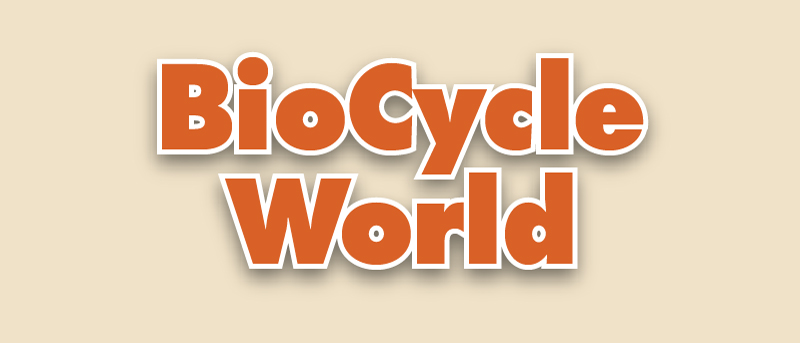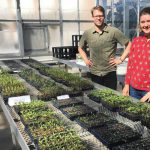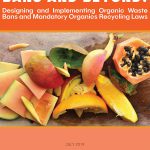BioCycle September/October 20196
California Bill Requires Front Of House Organics Collection
In early September, the California State Legislature passed Assembly Bill 827 requiring businesses to make composting and recycling bins accessible to customers at restaurants, malls, and other businesses by July 2020. Businesses already required to subscribe to recycling services under AB 341 or composting services under AB 1826 must offer customers this access to bins that are clearly marked with educational signage indicating what is accepted in the local solid waste programs. “Today’s passing of AB 827 in the Senate will help California to reach its ambitious climate change goal of requiring 75 percent of organic waste to be diverted from landfills by 2025,” noted Assemblymember Kevin McCarty, Chair of the Assembly Select Committee on Waste Reduction and Recycling in the 21st Century. “AB 827 — our Green Restaurants bill — will require the food service industry to provide bins for customers to properly sort our waste and work towards this crucial objective. This not only helps restaurants do their part, but it also teaches Californians to develop the habits necessary so we can collectively meet this challenge.”
PFAS Update From NEBRA
Since January 2017, the North East Biosolids and Residuals Association (NEBRA) has provided members and an expanding list of biosolids professionals across the continent with current science, legislative, and regulatory developments related to PFAS and biosolids and residuals. In the Association’s August 2019 newsletter, Ned Beecher, NEBRA’s Special Project Manager (and author of a 2-part PFAS article in BioCycle), reports that “there is beginning to be a clearer picture on the regulatory situation. Some states have set a new playing field. New Hampshire has formally finalized the lowest-in-the-nation MCLs (maximum contaminant levels) for PFAS in drinking water, which are also enforceable groundwater standards — in the teens of parts per trillion (ppt) for four PFAS. Earlier in the year, Maine required screening for PFOA and PFOS in biosolids and land-applied soils, using very low screening values, resulting in significant reductions in biosolids recycling.”
Beecher adds that additional state actions — and proposed federal legislation — “have the potential to create ongoing liability on wastewater utilities, municipalities, and biosolids/residuals programs for site remediations and groundwater cleanups because of past management practices. In those states where PFAS laws and regulations have come down on biosolids, there are now large obstacles to cost-effective recycling, unless regulatory adjustments or exemptions are provided. Already, the market for managing biosolids has been shaken, with prices for taking and managing biosolids from a water resource recovery facility (WRRF) increasing dramatically. For example, a Massachusetts facility reports a current increase from ~$87/wet ton to $120/wet ton.
“In the vast majority of U.S. states, actions on PFAS have been slower, and it is unclear whether New Hampshire and Maine will be unique or whether they have started a domino effect. The many demonstrated benefits of recycling biosolids to soils — lower net greenhouse gas emissions, use of local resources, closing nutrient and carbon loops, increasing community sustainability, replacing fossil fuel-based fertilizers, helping local agriculture, cost-effective management of solids that must be managed — all may be jeopardized in states that head toward very low standards without figuring out how to navigate unintended consequences. Recently, NEBRA has been focused on helping figure out how to navigate this, applying current science.”
CRRA Environmental Advocacy Award
Congratulations to Ana Carvalho in San Diego County, a BioCycle Contributing Editor and long-time advocate for food recovery, food waste recycling and zero waste! Carvalho received the California Resource Recovery Association’s (CRRA) Rick Best Environmental Advocacy Award at CRRA’s 2019 Conference in August. According to CRRA, “this award honors lifetime environmental stewardship achievements and recognizes individuals who effectively advocate for Earth’s natural systems. The award is for efforts that go beyond reuse, recycling and composting to encompass air and water quality, resource protection, and climate protection.” While working as an environmental specialist for the City of San Diego, Carvalho initiated commercial food waste collection and composting and assisted many commercial and institutional food waste generators — including San Diego County (California) Regional Airport Authority, San Diego State University, PETCO Park and numerous hotels — with source reduction, food recovery and source separation for composting.
Biosolids Greenhouse Gas Calculator
Over the past three years, Northwest Biosolids has been researching the viability of an online tool capable of modeling carbon emissions from biosolids and wastewater management processes. During this time, it has invested over $20,000 and began prototyping and initial research on the Biosolids Greenhouse Gas Calculator (BGGC) with a team that includes SYLVIS Environmental and Parallel Public Works. SYLVIS was part of the team that developed the Biosolids Emissions Assessment Model (BEAM) that is available in Excel. “Tracking greenhouse gas (GHG) emissions is becoming a vital necessity for public regulatory agencies and a requirement for some municipalities,” explains Maile Lono-Batura, Northwest Biosolids’ Executive Director. “The inspiration for the BGGC was to create a tool where you can evaluate biosolids and wastewater treatment processes and share your utility’s carbon footprint. Beyond utilities, government officials could use these vetted calculations to present the impact of wastewater and biosolids management decisions to their local councils. Ultimately, the BGGC could also serve as a standardized calculation to bring carbon credits to the biosolids industry.”
Current tools to calculate carbon emissions are largely siloed and there is not one standard to base industry wide calculations on, nor is there the ability to easily compare data outputs, estimates, etc., adds Lono-Batura.
Compostable Plastic Wrap From Sea Shells
In a lab at a Scottish startup, researchers are turning waste from the seafood industry into a new kind of compostable plastic wrap. “We’re in the process of developing fully compostable, antimicrobial food packaging which looks and feels to the consumer like the petroleum plastic version — but the difference is that it will not add to the millions of tons of waste that comes from packaging that has ended up in the oceans,” Cait Murray-Green, CEO of the start-up, called CuanTec (“cuan” is the Gaelic word for sea) told Fast Company. “The challenge is to create something that does the same job, but through a sustainable source.”
The start-up uses a fermentation process, similar to brewing beer, to extract a material called chitin from the shells of langoustine, a type of shellfish related to lobsters. The fishing industry in Scotland generates huge quantities of shellfish waste. While chitin has other industrial uses, the typical process for extracting it is expensive, and so most of the shells are thrown out. CuanTec’s process creates a pure, high-quality form of the material, which is converted into clear films for use in packaging.
Guide To Prepared Food Recovery
The San Diego (California) Food System Alliance recently published a Prepared Food Donation Case Study documenting best practices and lessons learned through its Smart Kitchens San Diego initiative. San Diego County generates 500,000 tons of food waste and 500,000 county residents face food insecurity. In the past, food donations have focused on the grocery store and retail industries, comprised mainly of canned food items and whole produce. “In recent years, a clear need has developed to increase the scope of food donations to include prepared, hot food items from kitchens such as restaurants, hospitals, hotels, universities, and other food production sectors,” notes the document. “This case study provides an example of a prepared food donation program — Smart Kitchens San Diego — led by the San Diego Food System Alliance in partnership with the San Diego Food Bank, Leanpath, 15 institutions and 4 non-profit partners.”
The guidance walks through identifying partners for prepared food recovery; food sources and types of food; food safety and storage; food containers; transportation logistics; lessons learned; and outcomes. The section on containers explains that the kitchen staff where the prepared food is coming from is “best suited to package and label all prepared foods for donation. Food donors are equipped — with equipment and environmental health department permits — to handle, portion and package food, while many food recipients are not.” Smart Kitchens San Diego discovered that half-size foil containers were the favored size.
Compost Comes Full Circle At Food Bank
In February 2018, Arlington County’s Solid Waste Bureau began a pilot program to make compost from residents’ food waste. Now some of that compost is coming full circle and being used in some of the local gardens that supply fresh produce for Arlington Food Assistance Center (AFAC). The Solid Waste Bureau collects food waste in two green barrels behind its headquarters in Shirlington. Collected organics are emptied into a 10-foot-high, 31-foot-long GMT Earth Flow composting system that processes materials under a glass roof and generates 33 cubic yards of compost, reports ARLNow. AFAC is experimenting with using the compost in a raised bed garden near its headquarters. Boy Scouts originally built the beds that now make up 550 square feet of gardening space, and grow lettuce, beets, spinach, green beans, kale, tomatoes, and radishes.










